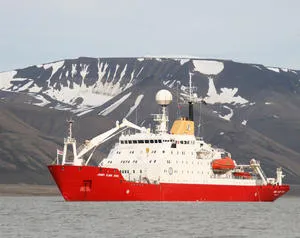
As the UK approaches summer with high hopes of good weather, a team of adventurous scientists will be setting sail for far chillier climes. Thirty researchers from eight laboratories will leave the UK on 1 June 2012 to study the effect of ocean acidification on the Norwegian, Barents and Greenland Seas
They will travel as far north as polar ice will allow, collecting seawater samples from both the open water and gaps in the sea-ice. This study is the largest ever to examine the effects of altering carbon dioxide (CO2) levels in “real world” seawater samples directly after they are collected at sea.
Polar seas are expected to be especially sensitive to the effects of ocean acidification, since more CO2 dissolves in cold water, making Arctic waters a valuable natural example of how the marine environment will respond to a high CO2 world. Also, the chemical sensitivity of surface seawater in the Arctic means that it will become corrosive to calcium carbonate before anywhere else in the world. This could pose a serious problem for marine plankton and other organisms that use calcium carbonate for their shells or skeletons.
During the expedition, the scientists will study the impact of the changing chemistry on marine organisms and ecosystems, the cycling of carbon and nutrients in the sea and how the sea interacts with the atmosphere to influence climate.
Two approaches will be used in this study. Firstly, the researchers will look at how ecosystems vary between areas where the chemistry of seawater is naturally more acidic or alkaline. By contrasting the observations over a range of different conditions, insights researchers will discover how acidification may affect organisms living in their natural environment, where natural selection and adaptation have had time to play out.
The second approach is experimental, using tanks of natural seawater collected from the upper ocean and brought into controlled conditions on deck. This natural seawater will be subjected to various levels of CO2 that are likely to occur in the future. The expedition, aboard the RRS James Clark Ross, will end on 4 July in Reykjavik, Iceland.
Dr Ray Leakey, Arctic Research Theme Leader at the Scottish Association for Marine Science (SAMS) and the leader of the current expedition says, “Few studies have investigated the effects of ocean acidification on the marine food web of the remote Arctic seas, and most have focused on laboratory cultures or natural communities from a limited number of relatively accessible coastal locations. By contrast our expedition will be by ship in both ice-covered and ice-free oceanic waters far from land. This will allow us to undertake the most comprehensive study to date of the ways in which the plants and animals living in the surface waters of the Arctic ocean respond to acidification.”
Dr Toby Tyrrell from the University of Southampton and coordinator of the Sea Surface consortium added, “Following our cruise last year to the northwest European shelf (for more information please see Notes to Editors), this second cruise will visit the more remote Arctic Ocean which may well be more seriously affected by ocean acidification. The data collected will improve our understanding of future impacts, providing important information about the consequences of continuing to burn fossil fuels in enormous quantities (atmospheric CO2 is already 40% above its preindustrial level, and still climbing). Our final cruise, in six months time, will visit the other polar ocean, the Southern Ocean.”
The global ocean has absorbed about a third of the total CO2 produced by human activities in the past 200 years. This uptake of CO2 has greatly slowed the rate of human-driven climate change. It is also responsible for major changes to ocean chemistry, known as ocean acidification, with potentially serious implications for marine life.
The research is part of the UK Ocean Acidification Research Programme (UKOA), funded by the Natural Environment Research Council (NERC), the Department of Environment, Food and Rural Affairs (Defra) and the Department of Energy and Climate Change (DECC).
Cruise led by Dr Ray Leakey
Project Coordinator: Dr Toby Tyrrell
Exchange Knowledge Officer: Athena Drakou
Participating universities and marine research centres:
British Antarctic Survey
- Marine Biological Association
- National Oceanography Centre (University of Southampton
- National Oceanography Centre (NERC
- Plymouth Marine Laboratory
- Scottish Association for Marine Science
- University College London
- University of Essex
The £12 million, five-year UK Ocean Acidification Research Programme is funded by the Natural Environment Research Council (NERC), the Department for Environment, Food and Rural affairs (Defra) and the Department of Energy and Climate Change (DECC). Outputs from the programme will feed into the cross Government Climate Change Adaptation programme and it will make a significant contribution to the Living with Environmental Change (LWEC) programme. The UK programme will collaborate with international colleagues – primarily with the German BIOACID programme, the European research programme EPOCA, and the emerging US Ocean Acidification research programme.